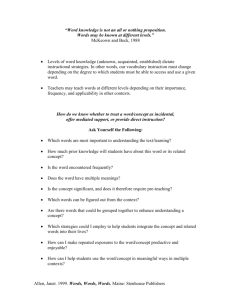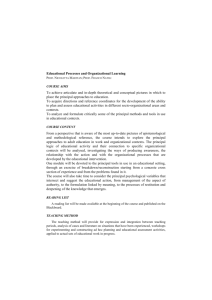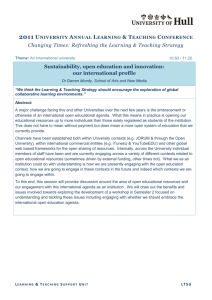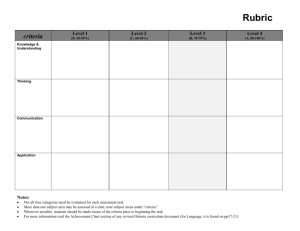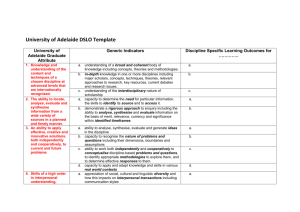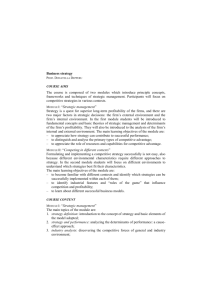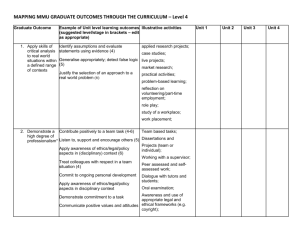UG Level Descriptors 2009 Final
advertisement
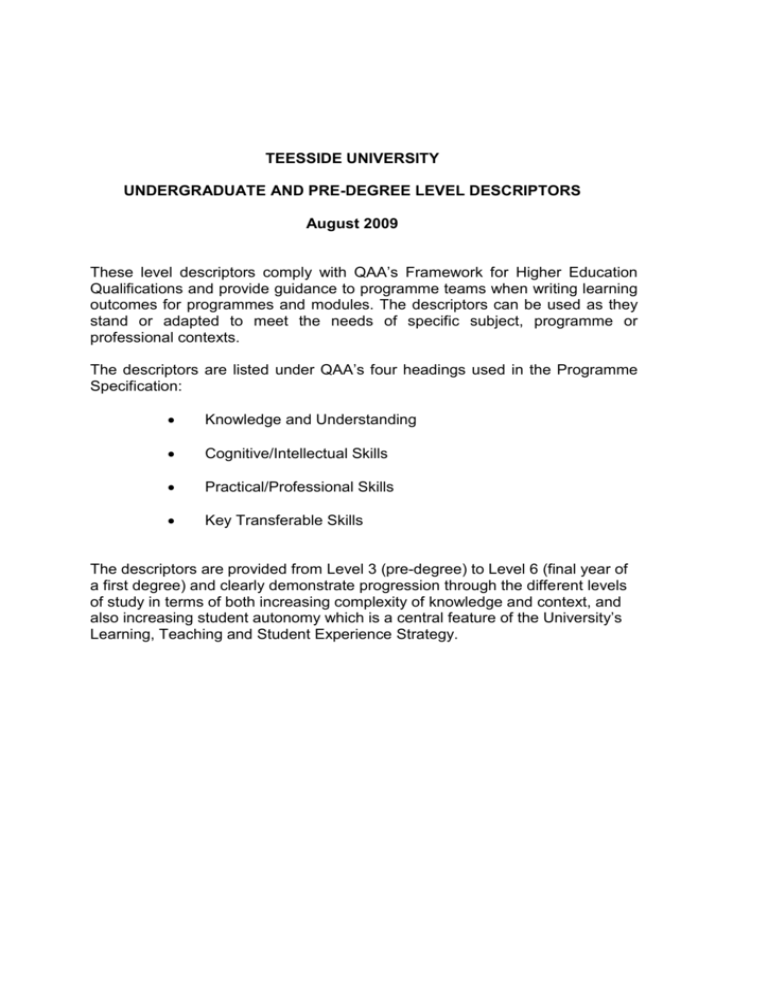
TEESSIDE UNIVERSITY UNDERGRADUATE AND PRE-DEGREE LEVEL DESCRIPTORS August 2009 These level descriptors comply with QAA’s Framework for Higher Education Qualifications and provide guidance to programme teams when writing learning outcomes for programmes and modules. The descriptors can be used as they stand or adapted to meet the needs of specific subject, programme or professional contexts. The descriptors are listed under QAA’s four headings used in the Programme Specification: Knowledge and Understanding Cognitive/Intellectual Skills Practical/Professional Skills Key Transferable Skills The descriptors are provided from Level 3 (pre-degree) to Level 6 (final year of a first degree) and clearly demonstrate progression through the different levels of study in terms of both increasing complexity of knowledge and context, and also increasing student autonomy which is a central feature of the University’s Learning, Teaching and Student Experience Strategy. UNDERGRADUATE AND PRE-DEGREE LEVEL DESCRIPTORS - KNOWLEDGE AND UNDERSTANDING Level 3 Level 4 Know and use a limited range of investigative procedures in simple, tutor-defined contexts Identify and explain selected research methods used in the discipline and apply them in defined and limited contexts Level 5 Critically review and select from alternative research methods in more complex situations Level 6 Plan, undertake and evaluate a negotiated, selfmanaged major project Apply the skills of research/enquiry-based approaches Possess a given knowledge base which may be largely factual and/or uneven Describe, explain and use key elements of the foundation knowledge and key concepts of the discipline Begin to recognise the scope of the discipline and its terminology Demonstrate a detailed knowledge of aspects of the discipline Demonstrate a comprehensive and detailed knowledge of the discipline Critically analyse a variety of ideas, contexts and frameworks associated with the discipline Synthesise and critically appraise different aspects of disciplinary knowledge in complex contexts Apply, question and relate appropriate knowledge / concepts to a range of activities Recognise the relevance of ethical issues in the discipline and relate these to own personal beliefs and values Identify, where applicable, the role of ethics in the generation of knowledge in the discipline Explore legal and ethical issues relevant to the generation of knowledge in the discipline Evaluate appropriate knowledge / concepts as an aid to problem-solving Analyse and evaluate the impact of ethical and legal issues relevant to the generation of knowledge in the discipline UNDERGRADUATE AND PRE-DEGREE LEVEL DESCRIPTORS - COGNITIVE AND INTELLECTUAL SKILLS Level 3 Level 4 Level 5 Level 6 Gather data from given sources in closelydefined contexts with significant tutor guidance Gather, record and describe, with guidance, data/evidence from a range of sources Analyse, apply and interpret data/evidence from a variety of sources Synthesise, appraise and evaluate data/evidence from appropriate sources to make independent judgements Construct a supported argument or interpretation within tutor-defined contexts Justify conclusions in defined and limited contexts Employ balanced, logical and supported argument in a range of contexts Question orthodoxy using balanced, logical and supported argument Recognise that there are different interpretations of given data Recognise the provisional and changing nature of knowledge Demonstrate intellectual flexibility and openness to new ideas Demonstrate intellectual flexibility and openness to new ideas Can apply given tools/methods to a welldefined problem and show emerging recognition of the complexity of associated issues Can apply given tools/methods accurately and carefully to a well-defined problem and begin to appreciate the complexity of associated issues Can identify key areas of problems and choose appropriate tools/methods for their resolution in a considered manner Is confident and flexible in identifying and defining complex problems and the application of appropriate knowledge, tools/methods to their solution 1 UNDERGRADUATE AND PRE-DEGREE LEVEL DESCRIPTORS - PRACTICAL AND PROFESSIONAL SKILLS Practical and professional skills are subject specific and descriptors should be developed by School or Programme Teams with reference to appropriate subject benchmarks and the requirements of relevant professional bodies. The general descriptors below reflect the increasing complexity of context within which the skills are applied and the increased level of autonomy with which the skills are used. They also highlight the importance of the ethical and legal framework of the particular discipline or profession. These factors should be clearly reflected in the subject specific Practical/Professional Skills developed by School or Programme Teams. Level 3 Application of Skills Can operate ethically in predictable, defined contexts that require use of a specified range of standard techniques Level 4 Level 5 Can operate ethically in predictable, defined contexts that require use of a specified range of standard techniques Can operate ethically in situations of varying complexity and predictability requiring the application of a wide range of techniques Can operate ethically in complex and unpredictable contexts, requiring selection and application from a wide range of standard or innovative techniques Autonomy in Skill Use Is able to act with limited autonomy, under direction or supervision, within defined guidelines Is able to act with limited autonomy, under direction or supervision, within defined guidelines Able to act with increasing autonomy, with reduced need for supervision and direction, within defined guidelines Able to act autonomously with limited supervision or direction within agreed guidelines UNDERGRADUATE AND PRE-DEGREE LEVEL DESCRIPTORS - KEY TRANSFERABLE SKILLS Level 3 Level 4 Level 5 Plan and Manage Own Learning Demonstrate a developing ability to evaluate Identify own learning strengths and needs Reflect systematically on performance to own strengths and weaknesses within criteria using feedback from assessments further develop learning largely set by others Develop and implement a personal development plan to improve own learning Career Development & Employability Demonstrate developing ability to identify Identify and articulate personal skills, abilities, Demonstrate a realistic match between career personal skills, interests and motivations and interests and motivations and relate these to aspirations and personal aptitudes, interests articulate the effect of these on programme career opportunities and motivations choice Communication Skills Demonstrate a developing ability to Identify and use writing skills appropriate to the Select and use a range of communication communicate in speech and writing in an context methods appropriate to the context academic context Communicate appropriately in speech in group Prepare, deliver and evaluate presentations to discussions and as an individual an audience Numeracy Skills Demonstrate a developing ability to apply Demonstrate numerical and statistical skills in Apply numerical and statistical skills in more numerical and statistical skills in simple simple contexts at a foundation level in the complex disciplinary contexts contexts discipline IT Skills Use basic IT tools (e.g. word-processing; spreadsheets; information searching) in simple contexts Use basic IT tools (e.g. word-processing; spreadsheets; information searching) in tutordefined contexts Use a range of specialist software appropriate to the discipline Work with Others Engage in team activities to enhance a cooperative approach to learning and working Engage in team activities to enhance a cooperative approach to learning and working Adopt a range of roles within a team and contribute to the effective working of the team 2 Level 6 Level 6 Plan, manage and evaluate the acquisition of new knowledge and skills as part of a lifelong learning strategy Demonstrate both employment potential and ability to manage future professional development Communicate clearly, fluently and effectively in a range of styles appropriate to the context Engage effectively in academic discussion and present arguments in a professional manner Select, apply and evaluate appropriate numerical and statistical methods for complex and open-ended tasks Select and evaluate software applications for different tasks within the context of the discipline Recognise and evaluate factors which enhance group processes and team-working, and modify and evaluate own personal effectiveness within a team
